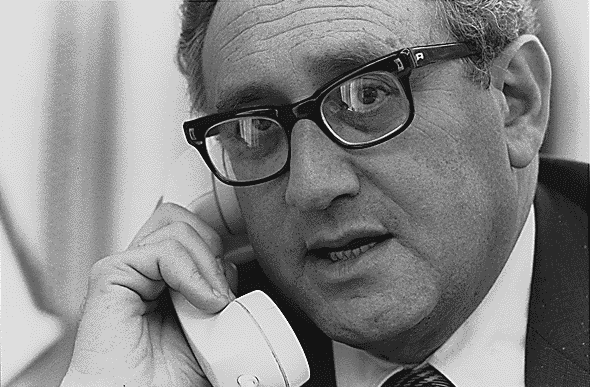50 Years After Hanoi’s Easter Offensive of 1972, Timely Reflections on America’s ‘Loss of National Will’ in Vietnam
‘The United States has a history of tiring with foreign wars and military commitments, and then accepting withdrawals that in retrospect had bad outcomes,’ one conference participant observed.

A conference harking back half a century to a climactic time in the Battle of Vietnam conjured bitter memories and intimations of an uncertain future for Americans caught up in global conflicts — whether they like it or not.
Speaker after speaker spoke critically of the “Paris Peace” reached by Henry Kissinger and Le Duc Tho in January 1973 after a year of fighting and then talking that had decimated the North Vietnamese but sapped the will of the Americans to win.
“The United States has a history of tiring with foreign wars and military commitments, and then accepting withdrawals that in retrospect had bad outcomes,” said the Rand Corporation’s Bruce Bennett when I asked him what kind of precedent the American failure in Vietnam had set for bad outcomes elsewhere.
The conference, run by the Vietnam Center of Texas Tech with Chapman University’s War and Society Program in Anaheim, California, coincided with the 50th anniversary of North Vietnam’s Easter offensive at which the forces from Hanoi suffered tremendous losses as Mr. Kissinger went into serious talks with Tho.
It was after the Americans and South Vietnamese had turned back North Vietnamese forces that had poured into South Vietnam on the east coast and from Cambodia and Laos that Mr. Kissinger, then President Nixon’s national security adviser, believed the Americans had the Communists on the ropes.
Maybe so, but the anti-war movement in America had grown exponentially as the years rolled by, and both Nixon and Mr. Kissinger were eager to reach a truce that Nixon claimed would bring “peace with honor.”
Mr. Kissinger on October 27 was bold enough to say “peace is at hand” though Tho balked at any deal that did not include the ouster of South Vietnam’s President Nguyen Van Thieu, who had balked at what he knew from the outset would result in the demise of his regime.
From Thieu’s perspective, “in October 1972 his army had with great effort just defeated the invasion by Hanoi’s entire army, save one division left in Laos,” said Stephen B. Young, an attorney who had served three years with the American aid program. Was Mr. Kissinger’s peace agreement “his reward,” Mr. Young asked me rhetorically after the conference.
Tho dropped that demand after Mr. Nixon had ordered the “Christmas bombing” of December 1972 and returned to the table, but Mr. Kissinger and Nixon between them fell for a deal that left North Vietnamese troops scattered throughout the South.
In return the Americans won the release of nearly 600 American POW’s, most of them pilots, but America, having withdrawn its troops and promising no more bombing, was powerless to stop North Vietnam from sending thousands more troops to the South through Laos and Cambodia via the Ho Chi Minh trail for the offensive that culminated in Hanoi’s triumph on April 30, 1975.
“After defeat our national security elite just dropped all things Vietnam in the ashcan of history; no lessons learned,” said Mr. Young, now based in St. Paul, Minnesota, as executive director of the Caux Round Table for Moral Capitalism. “The narrative of the Anti-War movement carried the day as confirmed by the 1975 failure so Americans lost their pride and self-confidence.”
That’s quite an indictment, but John Negroponte, who served for four years as a political officer in the American embassy in Saigon and then as Vietnam director on Mr. Kissinger’s National Security Council, does not like words like “sellout” or “betrayal” to characterize America’s desertion of the South Vietnamese government. Better, he said in a talk offering “perspectives from Saigon, Paris, and Washington, 1963-1973,” to say there was a “loss of national will.”
The complexities of what happened to America in those days came back to me while I recalled my own experience there in that period. There was the drama of the siege of An Loc, a town on Route 13 from the Cambodian border. I went up there day after day, stopping at a town named Lai Khe, as far as you could go. Finally, with B52’s bombing the North Vietnamese who were surrounding the town, the siege was broken and the South Vietnamese held the town.
The next time I went up Route 13, soon after the signing of the Paris peace, the North Vietnamese had taken the town after the departure of the South Vietnamese and Americans. They were honoring the ceasefire.
You could walk up Route 13 and chat with the North Koreans. I strolled up with my driver. While we were there a South Vietnamese plane circled around. My driver and I dove into the ditch as the bombs exploded. Shaken but unscathed, we made it back to the South Vietnamese positions in Lai Khe where our car awaited us.
There was no enduring ceasefire. I watched the last American prisoners being released in Hanoi in March as North Vietnamese recruits in clean green fatigues were seen on trains at the start of their journey southward by the Ho Chi Minh trail system. They would be transported unmolested southward.
At the Vietnam Center conference, not all the talk was about the failed peace. A doctoral candidate at the University of California, Santa Barbara, Addie Jensen, dwelled on the faltering American morale and will. “The country is behind you — 50 percent” was the title of her talk.
Overwhelming the agenda was the trauma the country had suffered — and still suffers. Navy Captain Josh Taylor caught the mood in a talk entitled, “The Shadow of Peace: The American ceasefire and Nixon’s failure to enforce the Paris Peace Accords.”

